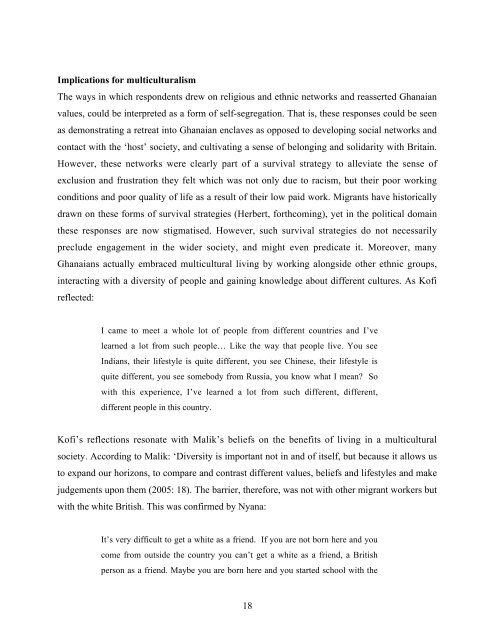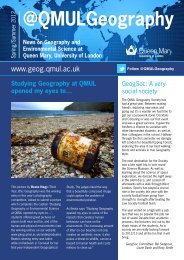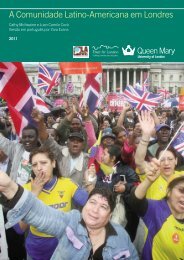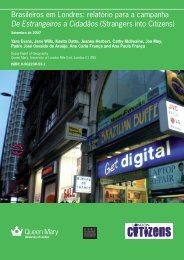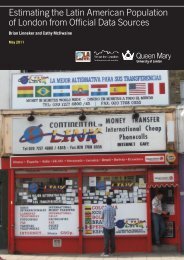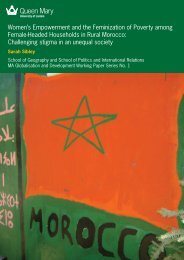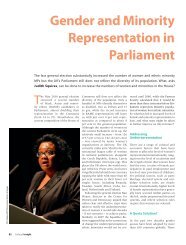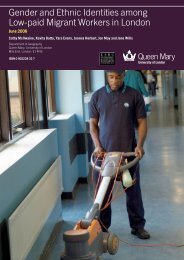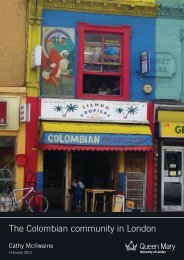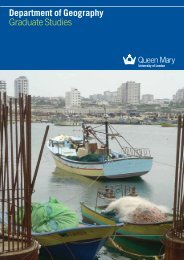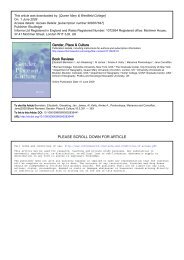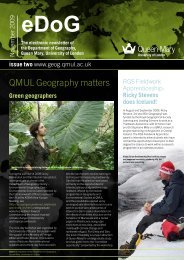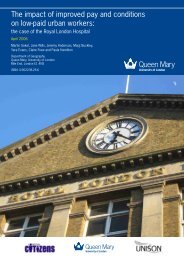It makes you feel, you feel pa<strong>in</strong>, because the happ<strong>in</strong>ess or the m<strong>in</strong>d th<strong>at</strong> you go throughcom<strong>in</strong>g to Brita<strong>in</strong>. I mean the country is very nice to live <strong>in</strong>, it is far better than ourcountry. I’ve been tell<strong>in</strong>g people s<strong>in</strong>ce I came th<strong>at</strong> I have the electricity, [it] does notturn <strong>of</strong>f, shortage <strong>of</strong> w<strong>at</strong>er and those everyday th<strong>in</strong>gs, here they have telephones <strong>in</strong> theirhouses, you have this, you are well <strong>of</strong>f, I mean we don’t, but we’re f<strong>in</strong>e. We don’t havesuch th<strong>in</strong>gs but we’re okay. You have it, but the way we are be<strong>in</strong>g tre<strong>at</strong>ed, sort <strong>of</strong>makes you feel no good, we don’t feel so good.<strong>The</strong>se narr<strong>at</strong>ives <strong>of</strong> home were also gendered, with several women claim<strong>in</strong>g they missed thechildcare support net<strong>work</strong>s th<strong>at</strong> were available to them <strong>in</strong> Ghana, whilst the men tended tolament their higher st<strong>at</strong>us back home as illustr<strong>at</strong>ed by their ownership <strong>of</strong> houses and cars. Georgeclaimed: ‘<strong>in</strong> Ghana I’ve got my own house everyth<strong>in</strong>g liv<strong>in</strong>g all right, good money, my own cars,two priv<strong>at</strong>e cars. I was alright. But here I don’t have noth<strong>in</strong>g. I’m broke and start afresh.’<strong>The</strong> <strong>in</strong>terview narr<strong>at</strong>ives were replete with st<strong>at</strong>ements th<strong>at</strong> juxtaposed Ghana and Brita<strong>in</strong> and theywere a way <strong>of</strong> articul<strong>at</strong><strong>in</strong>g and express<strong>in</strong>g their deep diss<strong>at</strong>isfaction with certa<strong>in</strong> aspects <strong>of</strong> theirlives <strong>in</strong> <strong>London</strong>. Yet they also reveal the contradictions and ambivalence th<strong>at</strong> is <strong>at</strong> the crux <strong>of</strong> themigrant experience (Gardner, 2002). This ambivalence was particularly reflected <strong>in</strong> theirst<strong>at</strong>ements about their economic situ<strong>at</strong>ion as they grappled with the paradox <strong>of</strong> liv<strong>in</strong>g <strong>in</strong> <strong>London</strong>.Th<strong>at</strong> is, whilst <strong>London</strong> <strong>of</strong>fered the opportunity to earn more money compared to Ghana, the cost<strong>of</strong> liv<strong>in</strong>g was also significantly higher. Many st<strong>at</strong>ed <strong>in</strong> the <strong>in</strong>terviews th<strong>at</strong> their wages did notmeet the costs <strong>of</strong> liv<strong>in</strong>g <strong>in</strong> <strong>London</strong> and particular concerns were the high cost <strong>of</strong> travel, counciltax and specifically, rent. Jennifer discussed the economic opportunities <strong>in</strong> Brita<strong>in</strong> but st<strong>at</strong>ed ‘one<strong>of</strong> the ma<strong>in</strong> concerns here is when I convert it <strong>in</strong>to our currency it’s a lot <strong>of</strong> money but becauseyou pay a lot <strong>of</strong> rent it’s mean<strong>in</strong>gless. Back home you’re not pay<strong>in</strong>g as much as this’. Similarly,Komla claimed th<strong>at</strong> he earned more money <strong>in</strong> <strong>London</strong> as cleaner than as an <strong>of</strong>fice <strong>work</strong>er <strong>in</strong>Ghana but he reflected, ‘<strong>in</strong> <strong>London</strong> liv<strong>in</strong>g is quite expensive and for everyth<strong>in</strong>g you have tocherish the pound, you really have to suffer for it and the little you get you have to use too. So ifyou don’t get paid, you can’t e<strong>at</strong>, you have to be really extremely careful before you can save,th<strong>at</strong>’s one th<strong>in</strong>g I don’t like’. As a result, many were ambivalent about their plans for their future,st<strong>at</strong><strong>in</strong>g th<strong>at</strong> they would only stay <strong>in</strong> Brita<strong>in</strong> if they could secure a better job: but they would onlyreturn to Ghana if they could establish their own bus<strong>in</strong>ess.17
Implic<strong>at</strong>ions for multiculturalism<strong>The</strong> ways <strong>in</strong> which respondents drew on religious and ethnic net<strong>work</strong>s and reasserted Ghanaianvalues, could be <strong>in</strong>terpreted as a form <strong>of</strong> self-segreg<strong>at</strong>ion. Th<strong>at</strong> is, these responses could be seenas demonstr<strong>at</strong><strong>in</strong>g a retre<strong>at</strong> <strong>in</strong>to Ghanaian enclaves as opposed to develop<strong>in</strong>g social net<strong>work</strong>s andcontact with the ‘host’ society, and cultiv<strong>at</strong><strong>in</strong>g a sense <strong>of</strong> belong<strong>in</strong>g and solidarity with Brita<strong>in</strong>.However, these net<strong>work</strong>s were clearly part <strong>of</strong> a survival str<strong>at</strong>egy to allevi<strong>at</strong>e the sense <strong>of</strong>exclusion and frustr<strong>at</strong>ion they felt which was not only due to racism, but their poor <strong>work</strong><strong>in</strong>gconditions and poor quality <strong>of</strong> life as a result <strong>of</strong> their low paid <strong>work</strong>. Migrants have historicallydrawn on these forms <strong>of</strong> survival str<strong>at</strong>egies (Herbert, forthcom<strong>in</strong>g), yet <strong>in</strong> the political doma<strong>in</strong>these responses are now stigm<strong>at</strong>ised. However, such survival str<strong>at</strong>egies do not necessarilypreclude engagement <strong>in</strong> the wider society, and might even predic<strong>at</strong>e it. Moreover, many<strong>Ghanaians</strong> actually embraced multicultural liv<strong>in</strong>g by <strong>work</strong><strong>in</strong>g alongside other ethnic groups,<strong>in</strong>teract<strong>in</strong>g with a diversity <strong>of</strong> people and ga<strong>in</strong><strong>in</strong>g knowledge about different cultures. As K<strong>of</strong>ireflected:I came to meet a whole lot <strong>of</strong> people from different countries and I’velearned a lot from such people… Like the way th<strong>at</strong> people live. You seeIndians, their lifestyle is quite different, you see Ch<strong>in</strong>ese, their lifestyle isquite different, you see somebody from Russia, you know wh<strong>at</strong> I mean? Sowith this experience, I’ve learned a lot from such different, different,different people <strong>in</strong> this country.K<strong>of</strong>i’s reflections reson<strong>at</strong>e with Malik’s beliefs on the benefits <strong>of</strong> liv<strong>in</strong>g <strong>in</strong> a multiculturalsociety. Accord<strong>in</strong>g to Malik: ‘Diversity is important not <strong>in</strong> and <strong>of</strong> itself, but because it allows usto expand our horizons, to compare and contrast different values, beliefs and lifestyles and makejudgements upon them (2005: 18). <strong>The</strong> barrier, therefore, was not with other migrant <strong>work</strong>ers butwith the white British. This was confirmed by Nyana:It’s very difficult to get a white as a friend. If you are not born here and youcome from outside the country you can’t get a white as a friend, a Britishperson as a friend. Maybe you are born here and you started school with the18


